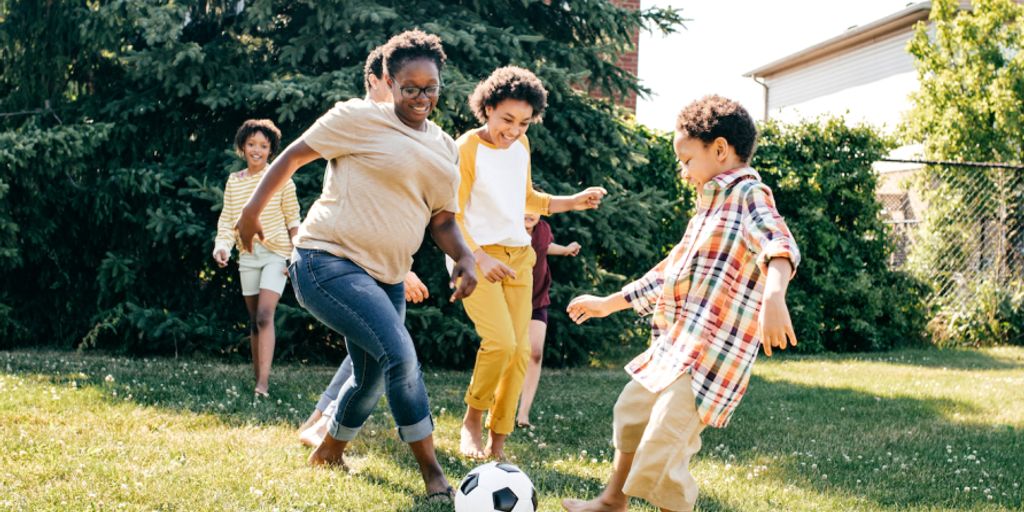
Play is so important that NAEYC has called it a central component in developmentally appropriate practice, and the United Nations High Commission on Human Rights declared it a fundamental right of every child. Play is not frivolous. It is not something to do after the “real work” is done. Play is the real work of childhood. Through it, children have their best chance for becoming whole, happy adults.
Key Takeaways
- Play is essential for cognitive development, enhancing problem-solving skills, creativity, memory, and concentration.
- Physical play promotes motor skills, physical fitness, and helps prevent childhood obesity.
- Social and emotional growth is fostered through play by building social skills, emotional resilience, empathy, and cooperation.
- Unstructured play encourages independence, curiosity, exploration, and mental flexibility.
- Parental involvement in play is crucial for creating a play-friendly environment, balancing screen time, and encouraging family activities.
The Role of Play in Cognitive Development

Enhancing Problem-Solving Skills
Play is an exceptional vehicle for cognitive growth. It offers a fertile ground where young minds can flourish. Through play, children explore the world around them, experiment with different ideas, and develop critical problem-solving skills. Play is a powerful tool for cognitive development in young children.
Boosting Creativity and Imagination
Children learn how to think abstractly, solve problems, and create new ideas. All these skills are essential for their academic success in the future. Play allows children to experiment with different roles and see how they fit into various social situations, thereby boosting their creativity and imagination.
Improving Memory and Concentration
The parts of the brain that are most developed in the early years are the ones that respond to active experiences. Play helps children improve their memory and concentration by engaging them in activities that require focus and attention. This not only aids in cognitive development but also prepares them for more structured learning environments.
Play is one of the main ways that children really consolidate their learning. The way we really make our skills permanent and enriched and highly developed, is often through our play experiences.
Physical Benefits of Play for Child Development

Promoting Motor Skills
When children engage in play that strengthens the finger muscles, they develop fine motor control. Activities like building puzzles, stacking blocks, and pushing toys are excellent for this. Play promotes healthy habits by actively engaging children in the world around them.
Encouraging Physical Fitness
Physical play involves movement and activity. Children run around, jump on beds, and swing on a swing set—basically anything that gets them moving! This type of play is essential for physical health and development, but it also has cognitive benefits, such as problem-solving during obstacle courses.
Preventing Childhood Obesity
Play counteracts issues many children face today, such as childhood obesity. By engaging in active play, children can maintain a healthy weight and develop lifelong habits of physical fitness.
Play nurtures relationships with oneself and others. It relieves stress and increases happiness. It builds feelings of empathy, creativity, and collaboration. It supports the growth of sturdiness and grit.
Social and Emotional Growth Through Play

Building Social Skills
Play can also help children develop social skills. They learn how to interact with others, share and take turns, and resolve conflicts. Playing with other children allows them to experiment with different roles and see how they fit into various social situations.
Fostering Emotional Resilience
One of the most significant benefits of play is that it allows children to explore their feelings and emotions. Through play, they can act out different scenarios, experiment with new behaviors, and work through difficult emotions. This can be especially helpful for children struggling with emotional difficulties or who have experienced a traumatic event.
Developing Empathy and Cooperation
Physical fun such as free play during recess helps develop children’s motor skills, prevent childhood obesity and build emotional intelligence. The gentle thrill of a playground slide, for example, lets a child build confidence as they take risks in a relatively safe environment. Games such as duck-duck-goose and tag also help children build other socio-emotional skills such as empathy as children learn to be careful not to hurt others by tapping someone too hard, for example.
Play nurtures relationships with oneself and others. It relieves stress and increases happiness. It builds feelings of empathy, creativity, and collaboration. It supports the growth of sturdiness and grit. When children are deprived of opportunities for play, their development can be significantly impaired.
The Impact of Unstructured Play on Child Development

Encouraging Independence
Unstructured play is crucial for children’s development, as it allows them to explore new ideas and figure out how to solve problems independently. This type of play is unplanned and happens based on what interests the child at the moment. Unstructured play doesn’t just benefit social-emotional development; it plays a vital role in cognitive development as well.
Stimulating Curiosity and Exploration
During unstructured playtime, children can pursue their own interests and activities, which helps them use their imaginations and creativity. Examples of unstructured play might be:
- Creative play alone or with others, including artistic or musical games
- Imaginative games – for example, making cubbyhouses with boxes or blankets, dressing up or playing make-believe
- Exploring new or favourite spaces like cupboards, backyards, parks, playgrounds, and so on
Supporting Mental Flexibility
Unstructured play allows children to practice new skills they are learning, such as negotiation and cooperation. It’s a time for you to put your “teacher” hat aside and allow your child to do it their way. Make-believe is a vital part of childhood.
For kids, play is serious business: it enhances brain structure and function and promotes the process of learning. And that’s just the beginning.
The Importance of Play in Early Childhood Education

Integrating Play into the Curriculum
Play is so important that NAEYC has called it a central component in developmentally appropriate practice, and the United Nations High Commission on Human Rights declared it a fundamental right of every child. Play is the real work of childhood. Through it, children have their best chance for becoming whole, happy adults.
Benefits of Play-Based Learning
The presence or absence of play, particularly in child development, has a great deal to do with competency, resiliency, emotional health, and brain size. Play is not frivolous and not just for kids, but something that is an inherent part of human nature. Unstructured play time is critical for healthy child development.
Teacher’s Role in Facilitating Play
Teachers play a crucial role in facilitating play in early childhood education. They create environments that encourage exploration and discovery, and they guide children in their play without directing it. This balance helps children develop independence and confidence.
Play benefits every aspect of child development as infants and toddlers explore their world and their bodies, while also learning about and mastering new skills.
Parental Involvement in Children’s Play

Parents play a pivotal role in encouraging their children to participate in various play activities. By fostering a supportive environment at home, parents can significantly enhance their child’s development. This includes setting up safe and engaging play spaces, providing a variety of toys and materials, and allowing children the freedom to explore and create.
In today’s digital age, balancing screen time with physical play is crucial. Parents should maintain a supportive attitude toward encouraging more active play. This includes setting clear limits on screen time and promoting outdoor activities. It’s essential to find a healthy balance that allows children to benefit from both digital and physical play.
Family play activities are a great way to strengthen bonds and create lasting memories. Parents can organize regular family game nights, outdoor adventures, or creative projects. These activities not only provide fun but also teach children valuable social and emotional skills.
Engaging in play with your children can help them develop empathy and cooperation, essential traits for their overall growth.
Challenges to Play in Modern Society

In today’s fast-paced world, children often have over-scheduled lives filled with structured activities, leaving little room for free play. This lack of unstructured time can hinder their ability to develop self-control and creativity. Parents and educators need to recognize the importance of balancing structured activities with ample opportunities for spontaneous play.
The rise of digital devices has significantly altered how children engage in play. While technology can offer educational benefits, excessive screen time can lead to a decline in physical activity and face-to-face social interactions. It’s crucial to find a balance between screen time and traditional play to ensure holistic development.
Urbanization and safety concerns have limited children’s access to outdoor play areas. Many parents are hesitant to let their children play outside due to fears of accidents or stranger danger. Additionally, the reduction of green spaces in urban areas further restricts opportunities for outdoor play. Communities need to work together to create safe and accessible play environments for children.
For thousands of years, play has been a childhood tradition. Unregulated and unstructured, it has passed from generation to generation. Even during periods of immense challenge, such as the Great Depression and World War II Nazi Germany, children found ways to be playful. But in the face of too many structured activities, loss of outdoor areas, and increased academic pressures, the essence of play is at risk of being lost.
Conclusion
In conclusion, play is an indispensable aspect of child development, recognized globally as a fundamental right and essential practice. It is through play that children learn, grow, and develop the competencies, resiliency, and emotional health necessary for adulthood. Play is not merely a leisure activity; it is the real work of childhood, fostering cognitive, physical, social, and emotional skills in ways that structured activities cannot. By prioritizing and encouraging play, we open up a world of opportunities for children to explore, discover, and thrive. The benefits of play are limitless, making it a critical component in nurturing whole, happy, and healthy individuals.
Frequently Asked Questions
Why is play considered a fundamental right for every child?
Play is so important that the United Nations High Commission on Human Rights declared it a fundamental right of every child. It is not frivolous but a central component in developmentally appropriate practice, providing children with their best chance to become whole, happy adults.
How does play impact a child’s brain development?
The presence or absence of play significantly affects competency, resiliency, emotional health, and brain size. Play is an inherent part of human nature and critical for healthy child development.
What are the benefits of unstructured play for children?
Unstructured play time is critical for healthy child development. It encourages independence, stimulates curiosity and exploration, and supports mental flexibility by allowing children to create their own enjoyment and experiences.
How can parents incorporate more play into their child’s life?
Parents can incorporate more play into their child’s life by creating a play-friendly environment, balancing screen time with play time, and encouraging family play activities. Taking the time to play with your child opens a world of opportunities for them to explore and discover new things.
What role does play have in early childhood education?
Play is essential in early childhood education. Integrating play into the curriculum and adopting play-based learning approaches allow children to learn, grow, and develop in ways that cannot be replicated in any other setting. Teachers play a crucial role in facilitating this play.
How does play promote physical health in children?
Play promotes physical health by actively engaging children in activities that develop motor skills, encourage physical fitness, and prevent childhood obesity. It helps children develop healthy habits by interacting with the world around them.






